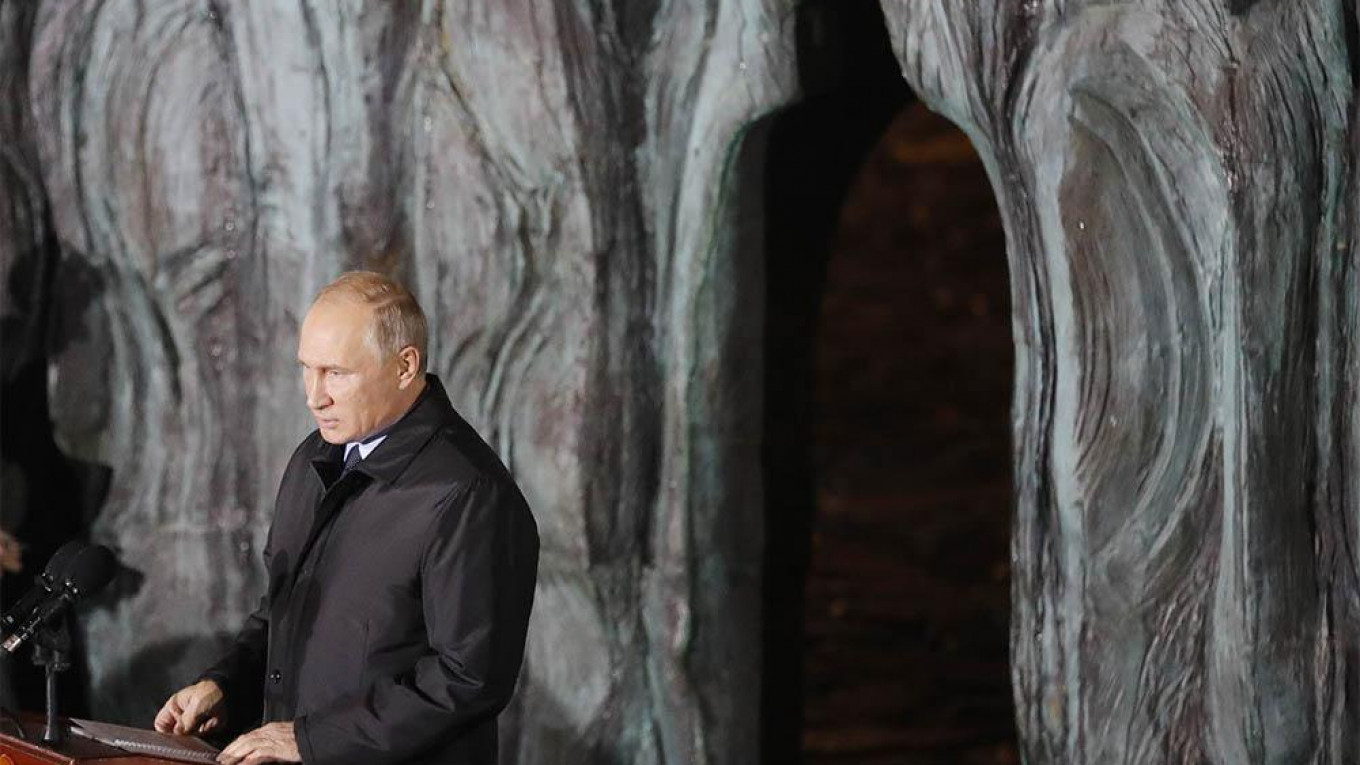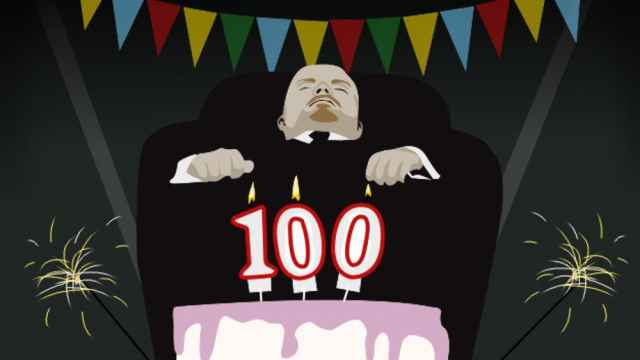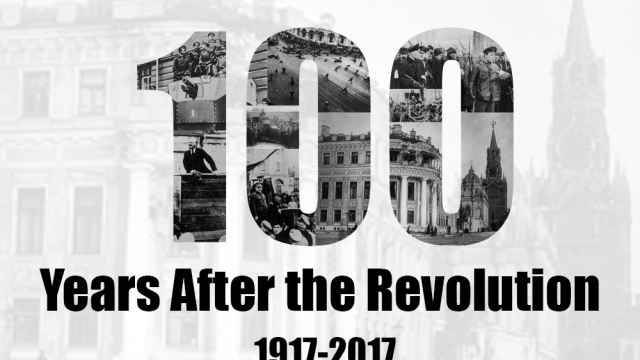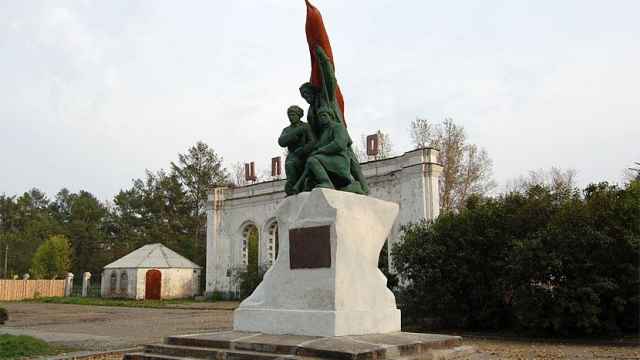The centennial of the Russian revolution is not a big thing in modern Russia. It feels like an obscure old holiday or a literary anniversary known only to the initiated. It is no longer a historical event that forms the nation’s founding myth.
On Monday, just a few days before Nov. 7, the date the centennial strikes, President Vladimir Putin took part in an unveiling of the Wall of Sorrow, a monument to victims of the very state that turns 100 years old in a week.
“We and our successors must remember the tragedy of repressions and their causes,” Putin said, speaking at a televised ceremony, shown as item one on national television. “But it does not mean one must call for revenge. Nobody can push society to the dangerous line of confrontation.”
This is classic Putin. He never said he approved of repression, but he never walked the walk to fully condemn the perpetrators of those crimes either.
Stalin was “a product of his epoch,” Putin recently told the director Oliver Stone. “It seems to me that excessive demonization of Stalin is one of the means of attacking the Soviet Union and Russia,” Putin said. “To show that today’s Russia bears some kind of birthmarks of Stalinism. We all have birthmarks of some kind—well, so what? Russia has changed fundamentally.”
Modern Russia is a legal successor to the Soviet Union, and yet the nation shies away from its date of birth.
Russia officially, and now symbolically, recognizes the crimes of the Soviet government, but Russia’s infamous secret police, in whose ranks most perpetrators worked, proudly traces its history to the early days of the 1917 revolution. President Putin calls on his countrymen to remember the tragedies of the past but warns them not to demonize the person who caused those very tragedies.
To build the monument to victims of state-perpetrated repression was a “sign of moral maturity,” Sergei Karaganov, dean of the School of Global Economy and Politics at the Higher School of Economics, told the pro-Kremlin newspaper Izvestia.
“A person who has not buried his parents cannot stride ahead,” Karaganov said enigmatically. “This is the deep meaning behind this monument.… Its erection signals not just society’s maturity but also its quiet and proud consciousness of the past.”
A small group of political activists and Soviet-era dissidents called the unveiling of the monument “untimely” and “cynical” as, they said, political repression in Russia was not abating but growing.
The Kremlin can now deny its detractors the moral high ground of honoring the people who died at the hands of Soviet rulers: here is a monument, Putin himself endorsed it.
Most of the activity independent from the government was held one day before at a different monument, the Solovetsky stone, erected 25 years ago opposite the headquarters of the Federal Security Service. Initiated by the activist group Memorial, the event is an annual gathering at which people recite the names of those killed in the purges and extralegal executions.
The Kremlin can now deny its detractors the moral high ground of honoring the people who died at the hands of Soviet rulers: here is a monument, Putin himself endorsed it. In a careful succession of subtle moves Putin put together a view of history that purports to be balanced but is also confusing.
Today’s Russia seems to be attached both to its Soviet and to its imperial past, but only to those layers of the past that it chooses to recognize.
Many of Russia’s official institutions have quietly extended their claims of origin to the structures of the Russian Empire that went defunct with the Bolshevik revolution.
The Industry and Trade Ministry says it was born in 1905 when Tsar Nicholas II signed the creation of an eponymous Russian ministry into law. The Russian Defense Ministry tells its story starting in 1802, the date when, under Tsar Alexander I, Russia’s first Military Infantry Ministry was formed.
The Interior Ministry begins its remembrances at an even earlier moment in time: in 1718, when Peter the Great appointed his first police chief, Anton Devier.
The champion is the Foreign Ministry. Russia’s foreign service traces its origin to the moment when, in 860 AD, Kievan Rus concluded its first known peace treaty with the Byzantine Empire. That was the moment Rus was recognized internationally, the website says.
The Federal Security Service (FSB) is one interesting exception (apart from the structures that simply could not exist before 1917). Insofar as other parts of the Russian state have found their imperial roots, the FSB could easily have tied itself to Peter the Great’s Secret Chancery or Nicholas I’s Own Chancery, whose Third Section was the political police of its time, but decided not to.
These are not legally drawn documents, of course, but examples of bureaucratic creativity approved at the respective ministries’ top levels of management. They are a faithful reflection of the Russian state’s self-image: it cherry-picks its continuities.
Legally Russia is not related to the Russian state that existed before 1917. The Soviet state cut its ties with the preceding entity and declared most treaties and agreements signed by the Russian Empire null and void. But the USSR cherry-picked among treaties and international legislation those it considered useful to keep in order to build cooperation with the Western world.
Much has been said about the Kremlin ignoring the Russian revolution because it considers the date too ominous: The rulers do not want a revolution, so they do not want their subjects to celebrate one. The reality is more complex.
Russia’s institutions have been inherited from Soviet ones. The cities and houses are all Soviet-built. And yet the pedigree that the elites foster is imperial Russia. The revolution is modern Russia’s birth certificate, but Russia does not like what it says.
Showcasing the revolution would be showcasing the humble origins of the current state. Family memories did not survive because telling family stories was not safe during the Soviet period. So people buried their memories. Now they pretend to suddenly remember it all.
To me, remembering the Russian state’s origins would be an act of honesty. By pretending to be an empire that it is not, Russia only increases the gap between its current self and an ideal it seems to admire.
Maxim Trudolyubov is a senior fellow with the Kennan Institute, where this article was originally published.
The views and opinions expressed in opinion pieces do not necessarily reflect the position of The Moscow Times.
A Message from The Moscow Times:
Dear readers,
We are facing unprecedented challenges. Russia's Prosecutor General's Office has designated The Moscow Times as an "undesirable" organization, criminalizing our work and putting our staff at risk of prosecution. This follows our earlier unjust labeling as a "foreign agent."
These actions are direct attempts to silence independent journalism in Russia. The authorities claim our work "discredits the decisions of the Russian leadership." We see things differently: we strive to provide accurate, unbiased reporting on Russia.
We, the journalists of The Moscow Times, refuse to be silenced. But to continue our work, we need your help.
Your support, no matter how small, makes a world of difference. If you can, please support us monthly starting from just $2. It's quick to set up, and every contribution makes a significant impact.
By supporting The Moscow Times, you're defending open, independent journalism in the face of repression. Thank you for standing with us.
Remind me later.








